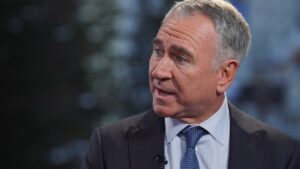Chinese President Xi Jinping told the United Nations General Assembly Tuesday that his country, the world’s largest polluter, “will not build new coal-fired power projects abroad.”
Xi also said China, the world’s second-largest economy, plans to boost support for clean energy in developing nations.
Both positions by the leading producer and consumer of coal-fired energy could be pivotal in helping secure broad agreement on meaningful climate-change action when officials gather for a highly anticipated conference in Glasgow in November.
Xi did not provide a timeline, nor further details.
A report earlier this year showed that China continued to create new, domestic coal-fired power very recently.
The release out last spring said Chinese coal consumption is poised to hit a record this year, a bump up that contradicts the view held by some climate change and energy experts that coal burning there had peaked.
Coal combustion is more carbon intensive than burning natural gas
NG00,
or petroleum
CL00,
for electricity. But most developing nations have sharply reduced their coal mining and burning. For instance, coal use accounted for about 61% of CO2 emissions from the energy sector but represented only 24% of the electricity generated in U.S. in 2019. In 2020, the U.S. marked the lowest level of coal production in any year since 1965.
President Joe Biden ahead of the U.N. meetings urged all nations to act to slow climate change or risk getting dangerously close to “a point of no return,” as pressure to replace pledges with action rises ahead of the highly anticipated Glasgow meetings. His Chinese counterpart was not part of a virtual exchange on climate change with several nations, but U.S. climate envoy John Kerry met with Chinese climate-change officials separately.
Read: Biden to U.N.: U.S. ‘will lead on all the greatest challenges of our time,’ but ‘not go it alone’
Xi on Tuesday reiterated his nation’s pledge for greenhouse gas emissions to peak before 2030 and to reach carbon neutrality by 2060, but did not offer strengthened domestic commitments. The 2060 pledge is about a decade longer than current pledges from the U.S. and the European Union.
This post was originally published on Market Watch







